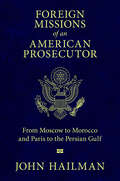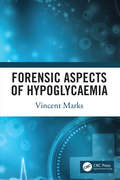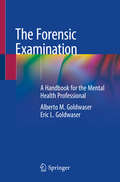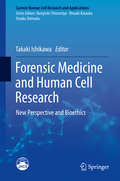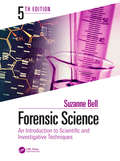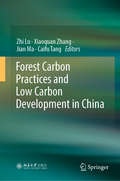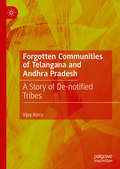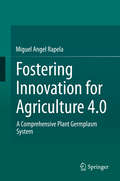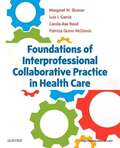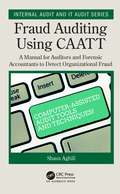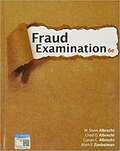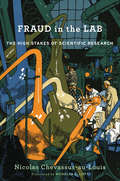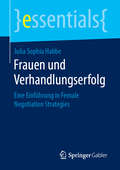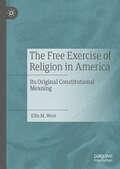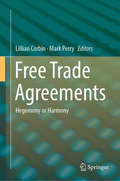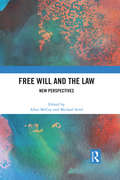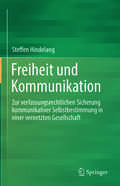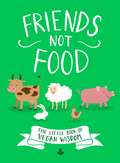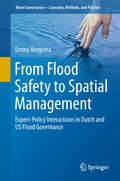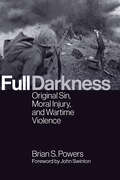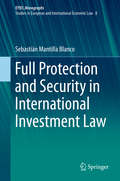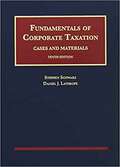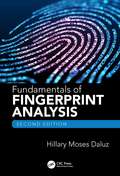- Table View
- List View
Foreign Missions of an American Prosecutor: From Moscow to Morocco and Paris to the Persian Gulf
by John HailmanIn his fifth book, John Hailman recounts the adventures and misadventures he experienced during a lifetime of international travel. From Oman to Indonesia, from sandstorms and food poisoning to gangsters and at least one jealous husband, Hailman explores the cultures and court systems of faraway countries. The international story begins in Paris as a young Hailman, a student at La Sorbonne, experiences the romance and excitement one expects from the City of Lights. Years later Hailman returns to France, to Interpol Headquarters in Lyon where he received his international law certificate from the National School for Magistrates. Traveling the world as a representative for the US Justice Department, Hailman encountered criminals and conspiracies, including a plot in Ossetia, Georgia, to hijack his helicopter and kidnap him. From his time as a prosecutor are tales of three very different Islamic cultures in the colorful societies and legal systems of Tunisia, Algeria, and Morocco. Hailman also travels to the chaotic world of the former Soviet Union where, at the time of his visit, a new world of old countries was trying to rediscover independent pasts. He explores the tiny country of Moldova and the beautiful and picturesque Republic of Georgia, and visits Russia during the brief period democracy was flowering and the nation was experimenting with a new jury trial system. Viewing his adventures through the lens of laws and customs, Hailman is able to give unique insight to the countries he visits. With each new adventure in Foreign Missions of an American Prosecutor, John Hailman shares his passion for travel and his fascination with other cultures.
Forensic Aspects of Hypoglycaemia: First Edition
by Vincent MarksThe Forensic Aspects of Hypoglycaemia succinctly covers the medicolegal considerations of hypoglycaemia in a variety of scenarios including driving fatalities, petty crime, homicide and suicide. Covering the definitions and diagnosis of hypoglycaemia to its bearing on criminal behavior, this book draws on the author's extensive experience and contains a wealth of information for physicians and lawyers, including cases from the author's past and notable cases in the public domain.
The Forensic Examination: A Handbook for the Mental Health Professional
by Alberto M. Goldwaser Eric L. GoldwaserThis book prepares the mental health professional to use scientific skills when working within a legal framework. Written by a seasoned forensic psychiatrist with decades of experience and professional honors, this text answers some of the most challenging questions psychiatrists face when mental health intersects with the courtroom. The text is supported with 34 case vignettes that demonstrate ways in which seemingly simple diagnoses have unique layers of complexities that are vital within the legal system. The resource covers topics that may not be elucidated in medical schools, including what to expect from an expert witness, how to communicate with attorneys who lack a medical background, managing opposing viewpoints, psychiatric and medical malpractice, harassment, employment status, and other difficult topics as it pertains to the law. The text also knits this understanding of forensic psychiatry with clinical knowledge, addressing violence and risk assessment, discrimination, disability evaluation, psychiatric disorders, criminal and civil competence, end-of-life care and decisions, and a wide array of medical topics that have unique concerns when placed in the context of the legal system.The Forensic Examination is a vital resource for psychiatrists, psychologists, criminal and civil defenders, and all professionals working with persons in the medicolegal system.
Forensic Medicine and Human Cell Research: New Perspective And Bioethics (Current Human Cell Research And Applications Ser.)
by Takaki IshikawaThis volume reviews the application of biochemical and molecular pathologies, which are based on conventional pathomorphology, toxicology, and DNA analysis technologies, not only to autopsies but also to the field of clinical medicine in general. The systematic and integrated use of biochemical, immmunohistochemical, and molecular pathology, toxicology, DNA analysis, and cell culture investigations reinforces the pathophysiological diagnostic criteria in a forensic autopsy for clinical diagnosis. The use of these technologies can help to determine the cause and process of death and characterize the functional pathophysiological changes in the body that occur during the death process. Recently, the systematization of the latest supplemental tests, diagnostic methods, and quality control has allowed us to conduct comprehensive data collection and analysis for a range of diseases. This book presents the latest findings on the pathology of a broad range of human diseases, based on data concerning postmortem biochemistry and molecular biology collected from approximately 1000 people. Further, it puts forward a code of ethics for undertaking pathophysiological research and describes research techniques for uncovering pathophysiological mechanisms. As such, it offers a unique resource for researchers in the field of forensic medicine and pathology, and for clinicians.
Forensic Science: An Introduction to Scientific and Investigative Techniques, Fifth Edition (Essentials Of Forensic Science Ser.)
by Suzanne BellCovering a range of fundamental topics essential to modern forensic investigation, the fifth edition of the landmark text Forensic Science: An Introduction to Scientific and Investigative Techniques presents contributions and case studies from the personal files of experts in the field. In the fully updated 5th edition, Bell combines these testimonies into an accurate and engrossing account of cutting edge of forensic science across many different areas. Designed for a single-term course at the undergraduate level, the book begins by discussing the intersection of law and forensic science, how things become evidence, and how courts decide if an item or testimony is admissible. The text invites students to follow evidence all the way from the crime scene into laboratory analysis and even onto the autopsy table. Forensic Science offers the fullest breadth of subject matter of any forensic text available, including forensic anthropology, death investigation (including entomology), bloodstain pattern analysis, firearms, tool marks, and forensic analysis of questioned documents. Going beyond theory to application, this text incorporates the wisdom of forensic practitioners who discuss the real cases they have investigated. Textboxes in each chapter provide case studies, current events, and advice for career advancement. A brand-new feature, Myths in Forensic Science, highlights the differences between true forensics and popular media fictions. Each chapter begins with an overview and ends with a summary, and key terms, review questions, and up-to-date references. Appropriate for any sensibility, more than 350 full-color photos from real cases give students a true-to-life learning experience. *Access to identical eBook version included Features Showcases contributions from high-profile experts in the field Highlights real-life case studies from experts’ personal files, along with stunning full-color photographs Organizes chapters into topics most popular for coursework Covers of all forms of evidence, from bloodstain patterns to questioned documents Includes textboxes with historical notes, myths in forensic science, and advice for career advancement Provides chapter summaries, key terms, review questions, and further reading Includes access to an identical eBook version Ancillaries for Instructors: PowerPoint® lecture slides for every chapter A full Instructor’s Manual with hundreds of questions and answers—including multiple choice Additional chapters from previous editions Two extra in-depth case studies on firearms and arson (photos included) Further readings on entomological evidence and animal scavenging (photos included)
Forest Carbon Practices and Low Carbon Development in China
by Zhi Lu Jian Ma Xiaoquan Zhang Caifu TangThis is the first book illustrating China’s forest carbon projects. It includes an analysis of the policy and future development trends of China’s forest carbon market and showcases the country’s most representative forest carbon projects. Accordingly, it offers a valuable resource for all policymakers and researchers interested in forest carbon, as well as project developers and engineers involved in forest carbon projects.
Forgotten Communities of Telangana and Andhra Pradesh: A Story of De-notified Tribes
by Vijay KorraThe book discusses the socio-cultural-historical, occupational, educational, employment and discriminatory status of one of the most neglected and marginalised communities: the de-notified tribes or ex-criminal tribes of Telangana and Andhra Pradesh. Based on primary data collected from 14 communities in 11 districts in these states, it discusses the current state of affairs concerning de-notified tribes. There is no accurate and comprehensive information available on the present socio-economic status of these communities, either in the literature or with government agencies. This book provides valuable information on how they are faring in post-independence India since their de-notification from the Criminal Tribes Act, 1871.
Fostering Innovation for Agriculture 4.0: A Comprehensive Plant Germplasm System
by Miguel Angel RapelaThe scientific and technical development of any kind of germplasm is regulated by a vast network of treaties, conventions, international agreements, and national and regional legislation. These regulations govern biotechnological innovations in plants and microorganisms, access to and use of plant genetic resources, and biosafety. This complex mix has made it difficult to arrive at global interpretations, due to overlaps, gaps, ambiguities, contradictions, and lack of consistency. The big picture is even more complex, as a series of scientific developments – gene editing in particular – have in some cases rendered these international regulatory frameworks obsolete.This book puts forward an innovative approach: a “Comprehensive Plant Germplasm System”. The System is a cooperative game theory-based proposal for a binding international convention which would supersede all other conventions, treaties, national and regional legislation covering native varieties and traditional developments, heterogeneous plant varieties, microorganisms, biotechnological inventions, plant genetic resources, and biosafety regulation. In short, it offers a comprehensive framework regarding intellectual property, biosafety, and business regulation and covers all types of germplasm.If applied, the system is expected to yield higher productivity rates in crops and improved food biodiversity, as well as a new paradigm based on the promotion of innovation for “Agriculture 4.0.”
Foundations Of Interprofessional Collaborative Practice In Health Care
by Margaret Slusser Luis I. Garcia Carole-Rae Reed Patricia Quinn McGinnisHealth care is a team effort, so why keep training for solo sprints?Introducing Foundations of Interprofessional Collaborative Practice in Health Care - a unique new textbook that will equip you to become an effective member of interprofessional healthcare teams. This completely new textbook is the first on the market to introduce the Interprofessional Education Collaborative (IPEC, 2011, 2016) Core Competencies for Interprofessional Collaborative Practice and to provide practice in applying these competencies to everyday practice. Expertly written by an interprofessional team for a wide variety of health professions students, this textbook provides a solid foundation in the four Core Competencies: Values and Ethics for Interprofessional Practice, Roles and Responsibilities, Interprofessional Communication, and Teams and Teamwork. It then elaborates each Core Competency by defining and describing each Sub-Competency. With a variety of interactive Case Studies, Caselets, and Exemplar Case Studies, it then illustrates the contributions and interconnectedness of each provider’s role to demonstrate how Core Competencies would be applied and put into action for improved patient outcomes. UNIQUE! Three-part units each addressing one of the four IPEC Core Competencies to help you to understand the core competencies and learn how to apply them in your own profession. UNIQUE! Detailed explorations of each Sub-Competency for all four IPEC Core Competencies thoroughlypresent the essential elements of each Core Competency for deep understanding of how to collaborate with other professions. UNIQUE! Case Studies, "Caselets," and Exemplar Case Studiesillustrate each competency and provide opportunities for you to apply your understanding of the material. A variety of Active Learning activities driven by core content are integrated into each chapter. UNIQUE! Global Perspectives boxes and additional international resources highlight the important work being done internationally in interprofessional education and interprofessional collaborative practice. Research Highlights help you to understand the reasoning and knowledge behind the Core Competencies. Learning Outcomes and Key Pointsoutline and review the main takeaways from each chapter.
Fraud Auditing Using CAATT: A Manual for Auditors and Forensic Accountants to Detect Organizational Fraud (Internal Audit and IT Audit)
by Shaun AghiliThis book discusses various common occupational and organizational fraud schemes, based on the Association of Certified Fraud Examiners (ACFE) fraud tree and assist fraud examiners and auditors in correctly choosing the appropriate audit tests to uncover such various fraud schemes. The book also includes information about audit test red flags to watch out for, a list of recommended controls to help prevent future fraud related incidents, as well as step-by-step demonstrations of a number of common audit tests using IDEA® as a CAATT tool.
Fraud Examination (Mindtap Course List)
by W. Steve Albrecht Chad O. Albrecht Conan C. Albrecht Mark F. ZimbelmanLearn to identify, detect, investigate and prevent financial fraud today with the latest edition of Albrecht/Albrecht/Albrecht/Zimbelman's FRAUD EXAMINATION, 6E. Develop fraud skills as you become a better interviewer, stronger and more skeptical document examiner, better technology user and more informed decision maker. Closely examine and gain a strong understanding of the types of fraud and nature of fraud investigation today with current business examples and numerous actual fraud cases, delivered first-hand from the authors' experience. FRAUD EXAMINATION presents today's most important fraud concepts with an emphasis on the growing areas of ebusiness and cyber fraud. Significant discussion familiarizes you with forensic analysis as well as legal options for victims of fraud. New discussion also highlights how experts use technology to accomplish fraud and detect fraud.
Fraud in the Lab: The High Stakes of Scientific Research
by Nicolas Chevassus-au-LouisFrom manipulated results and fake data to retouched illustrations and plagiarism, cases of scientific fraud have skyrocketed in the past two decades. In a damning exposé, Nicolas Chevassus-au-Louis details the circumstances enabling the decline in scientific standards and highlights efforts to curtail future misconduct.
Frauen und Verhandlungserfolg: Eine Einführung In Female Negotiation Strategies (Essentials)
by Julia Sophia HabbeTäglich muss jeder von uns verhandeln. Dabei macht es einen Unterschied, ob Männer oder Frauen dies tun. So neigen Frauen dazu, sich mit schlechteren Ergebnissen zufrieden zu geben als Männer. Nach der Forschung lässt sich das mit dem gesellschaftlichen Rollenbild erklären. Wenn Frauen in Konflikten „tough“ auftreten, fürchten sie, ihrem Rollenbild nicht zu entsprechen und negative Gegenreaktionen – zum Beispiel in Form von Sympathieverlust – hervorzurufen (so genannter Backlash-Effekt). Welchen Ausweg gibt es? Dieser Frage geht die genderspezifische Verhandlungsforschung nach. Die Forschungsergebnisse werden in dem vorliegenden essential so vorgestellt, dass sie von jeder Leserin in einer Verhandlungssituation genutzt werden können.Die Autorin Dr. Julia Sophia Habbe ist spezialisiert auf Konfliktlösung, Prozessführung sowie interne Untersuchungen. Sie ist Partnerin einer internationalen Wirtschaftskanzlei in Frankfurt am Main und Lehrbeauftragte der Johann Wolfgang Goethe-Universität im Bereich genderspezifische Verhandlungsführung.
The Free Exercise of Religion in America: Its Original Constitutional Meaning
by Ellis M. WestThis book explains the original meaning of the two religion clauses of the First Amendment: “Congress shall make no law [1] respecting an establishment of religion or [2] prohibiting the free exercise thereof.” As the book shows, both clauses were intended to protect the free exercise of religion or religious freedom. West shows the position taken by early Americans on four issues: (1) the general meaning of the “free exercise of religion,” including whether it is different from the meaning of “no establishment of religion”; (2) whether the free exercise of religion may be intentionally and directly limited, and if so, under what circumstances; (3) whether laws regulating temporal matters that also have a religious sanction violate the free exercise of religion; and (4) whether the free exercise of religion gives persons a right to be exempt from obeying valid civil laws that unintentionally and indirectly make it difficult or impossible to practice their religion in some way. A definitive work on the subject and a major contribution to the field of constitutional law and history, this volume is key to a better understanding of the ongoing constitutional adjudication based on the religion clauses of the First Amendment.
Free Trade Agreements: Hegemony Or Harmony
by Lillian Corbin Mark PerryThis book brings together international perspectives on free trade issues that affect civil society from the general populace to the governments of nations, and is relevant not only for lawyers, but also policymakers, international actors and businesses, as well as those with a general interest in free trade agreements. The book examines the manifestation of the concept of free trade in agreements, such as the Trans-Pacific Partnership (TPP), Regional Comprehensive Economic Partnership (RCEP), and China-Australia Free Trade Agreement (ChAFTA). It asks whether such agreements are entered into for the purposes of enhancing trading relationships between partner nations, strengthening commercial ties, and fostering economic growth; or are they sometimes used merely for local political outcomes of the most influential nations.
Free Will and the Law: New Perspectives
by Allan McCay Michael SevelThis volume brings together many of the world’s leading theorists of free will and philosophers of law to critically discuss the ground-breaking contribution of David Hodgson’s libertarianism and its application to philosophy of law. The book begins with a comprehensive introduction, providing an overview of the intersection of theories of free will and philosophy of law over the last fifty years. The eleven chapters collected together divide into two groups: the first five address libertarianism within the free will debate, with particular attention to Hodgson’s theory, and in Part II, six contributors discuss Hodgson’s libertarianism in relation to issues not often pursued by free will scholars, such as mitigation of punishment, the responsibility of judges, the nature of judicial reasoning and the criminal law process more generally. Thus the volume’s importance lies not only in examining Hodgson’s distinctive libertarian theory from within the free will literature, but also in considering new directions for research in applying that theory to enduring questions about legal responsibility and punishment.
Freiheit und Kommunikation: Zur verfassungsrechtlichen Sicherung kommunikativer Selbstbestimmung in einer vernetzten Gesellschaft
by Steffen HindelangDieses Buch gibt Antworten darauf, wie in Zeiten von Facebook und Fake News der verfassungsrechtliche Schutz des freien öffentlichen Diskurses gelingen kann. Es untersucht, wie die Verfassung auf einen nicht mehr nur durch Rundfunk und Presse klassischen Zuschnitts, sondern auch durch eine Vielzahl Einzelner organisierten massenmedialen Diskurs reagiert und wie das Verständnis der den Diskurs prägenden verfassungsrechtlichen Bausteine aktualisiert werden kann.Die technischen und wirtschaftlichen Bedingungen massenmedialer Kommunikation haben sich fundamental gewandelt. Das vorherrschende verfassungsdogmatische Schutzkonzept – ein „Ersatzmodell von Freiheit“ – kann diesem Wandel nicht ausreichend Rechnung tragen. Der Einzelne muss heute nicht mehr nur vor, sondern auch in seiner Medienmacht geschützt werden. Ausgehend von kommunikationswissenschaftlichen Erkenntnissen wird ein verfassungsrechtliches Verständnis entwickelt, das den Einzelnen wieder ins Zentrum eines freien massenmedialen Diskurses rückt.
Friends Not Food: The Little Book of Vegan Wisdom
by AnonymousChickens, Cows, Ducks, Sheep, Pigs, Rabbits, Trout, Salmon, Prawns, Lobsters - all of the animal kingdom - are not here for us to eat, we should be looking after them.Friends Not Food is a celebration of our relationship with our animal friends and is packed with vegan sayings as well as facts about both those animals and the industries that prey on them.The perfect gift for anyone who loves animals!And whilst you #StayHome, don't miss these other great titles from Sphere Books: ** Distract Yourself: 101 Positive Things to Do and Learn Whilst You Stay Home ** ** The Bumper Book of Would You Rather? Over 350 hilarious hypothetical questions for ages 6 to 106 **** Home Sweet Home: The Little Book of Natural Cleaning **** Shelf Respect: A Book Lovers' Guide to Curating Book Shelves at Home **
Friends Not Food: The Little Book of Vegan Wisdom
by AnonymousChickens, Cows, Ducks, Sheep, Pigs, Rabbits, Trout, Salmon, Prawns, Lobsters - all of the animal kingdom - are not here for us to eat, we should be looking after them.Friends Not Food is a celebration of our relationship with our animal friends and is packed with vegan sayings as well as facts about both those animals and the industries that prey on them.The perfect gift for anyone who loves animals!And whilst you #StayHome, don't miss these other great titles from Sphere Books: ** Distract Yourself: 101 Positive Things to Do and Learn Whilst You Stay Home **** The Bumper Book of Would You Rather? Over 350 hilarious hypothetical questions for ages 6 to 106 **** Home Sweet Home: The Little Book of Natural Cleaning **** Shelf Respect: A Book Lovers' Guide to Curating Book Shelves at Home **
From Flood Safety to Spatial Management: Expert-Policy Interactions in Dutch and US Flood Governance (Water Governance - Concepts, Methods, and Practice)
by Emmy BergsmaThis book deals with the introduction of a new type of “spatial measures" in flood governance. In contrast to traditional “safety measures" that aim to provide protection against floods by building structural flood defenses such as levees and flood walls, the goal of spatial measures is to reduce the exposure to flood risks by changing the spatial layout of flood-prone areas. By limiting developments and flood-proofing buildings in areas at risk to flooding, investments in structural flood defenses can be circumvented and vulnerabilities reduce. World-wide, spatial measures are gaining attractiveness as a response strategy to increasing flood risks caused by climate change and urbanization. The introduction of spatial measures in flood governance involves more than the simple development of new policies and laws. Research has demonstrated that the implementation of spatial measures can have huge implications for how costs and responsibilities are divided between different levels of governance and between public and private actors, changing the whole organization behind flood governance. Both for the effectiveness and for the legitimacy of spatial flood governance strategies, it is important that these distributive implications are well understood. This book describes the introduction of spatial measures in the context of two very different delta countries: the Netherlands and the United States. In the United States, a spatial flood governance strategy was already developed in de mid-20th century whereas in the Netherlands, a safety paradigm institutionalized over the course of the 20th century and spatial measures have only recently been introduced. By analyzing the science-policy interactions underlying the implementation of spatial measures in both countries, this book shows how under the influence of different types of experts (engineers in the Netherlands and social geographers in the United States) different spatial flood management strategies emerged with different distributive implications, each with its own challenges for effectiveness and legitimacy.
Full Darkness: Original Sin, Moral Injury, and Wartime Violence
by John Swinton Brian S. PowersA theological treatment of war, trauma, and the fundamental character of human existence In Full Darkness theologian and wartime veteran Brian Powers argues that the Augustinian concept of original sin can illuminate the nature of wartime violence, particularly through the lens of veteran trauma. He shows precisely how sin and war both cause human identity, agency, and hope to be lost.Powers explores sin as a pathogenic disfigurement that shapes cultural values and ethical ideas, frequently resulting in moral injury. Combat veterans experience a humanity deprived of grace and are devoured by the forces of war, often suffering post-traumatic stress disorder. But Powers provides a ray of hope and a path towards healing.Ideal for veterans, chaplains, and pastors, Full Darkness offers a new perspective on the cultural understanding of military violence, provides theological help for those drowning in guilt and shame, and paves the way for reclaiming positive human agency and identity.
Full Darkness: Original Sin, Moral Injury, and Wartime Violence
by Brian S. PowersA theological treatment of war, trauma, and the fundamental character of human existence In Full Darkness theologian and wartime veteran Brian Powers argues that the Augustinian concept of original sin can illuminate the nature of wartime violence, particularly through the lens of veteran trauma. He shows precisely how sin and war both cause human identity, agency, and hope to be lost.Powers explores sin as a pathogenic disfigurement that shapes cultural values and ethical ideas, frequently resulting in moral injury. Combat veterans experience a humanity deprived of grace and are devoured by the forces of war, often suffering post-traumatic stress disorder. But Powers provides a ray of hope and a path towards healing.Ideal for veterans, chaplains, and pastors, Full Darkness offers a new perspective on the cultural understanding of military violence, provides theological help for those drowning in guilt and shame, and paves the way for reclaiming positive human agency and identity.
Full Protection and Security in International Investment Law (European Yearbook of International Economic Law #8)
by Sebastián Mantilla BlancoThis book provides a comprehensive study of the standard of ‘full protection and security’ (FPS) in international investment law. Ever since the Germany-Pakistan BIT of 1959, almost every investment agreement has included an FPS clause. FPS claims refer to the most diverse factual settings, from terrorist attacks to measures concerning concession contracts. Still, the FPS standard has received far less scholarly attention than other obligations under international investment law. Filling that gap, this study examines the evolution of FPS from its medieval roots to the modern age, delimits the scope of FPS in customary international law, and analyzes the relationship between FPS and the concept of due diligence in the law of state responsibility. It additionally explores the interpretation and application of FPS clauses, drawing particular attention to the diverse wording used in investment treaties, the role ascribed to custom, and the interplay between FPS and other treaty-based standards. Besides delivering a detailed analysis of the FPS standard, this book also serves as a guide to the relevant sources, providing an overview of numerous legal instruments, examples of state practice, arbitral decisions, and related academic publications about the standard.
Fundamentals Of Corporate Taxation (University Casebook Ser.)
by Stephen Schwarz Daniel LathropeFundamentals of Corporate Taxation (University Casebook Series) 10th Edition
Fundamentals of Fingerprint Analysis, Second Edition
by Hillary Moses DaluzBuilding on the success of the first Edition—the first pure textbook designed specifically for students on the subject—Fundamentals of Fingerprint Analysis, Second Edition provides an understanding of the historical background of fingerprint evidence, and follows it all the way through to illustrate how it is utilized in the courtroom. An essential learning tool for classes in fingerprinting and impression evidence—with each chapter building on the previous one using a pedagogical format—the book is divided into three sections. The first explains the history and theory of fingerprint analysis, fingerprint patterns and classification, and the concept of biometrics—the practice of using unique biological measurements or features to identify individuals. The second section discusses forensic light sources and physical and chemical processing methods. Section three covers fingerprint analysis with chapters on documentation, crime scene processing, fingerprint and palm print comparisons, and courtroom testimony. New coverage to this edition includes such topics as the biometrics and AFIS systems, physiology and embryology of fingerprint development in the womb, digital fingerprint record systems, new and emerging chemical reagents, varieties of fingerprint powders, and more. Fundamentals of Fingerprint Analysis, Second Edition stands as the most comprehensive introductory textbook on the market.
